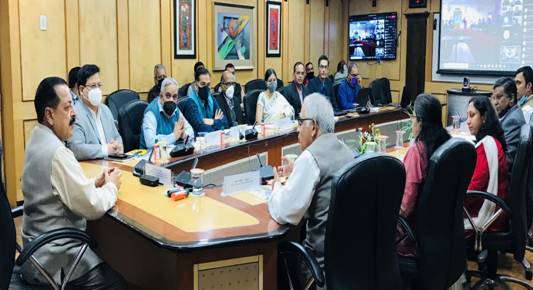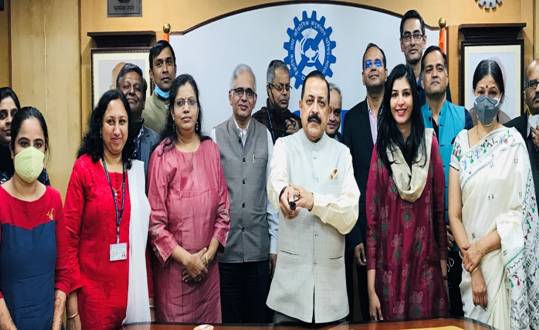Union Minister of State (Independent Charge) Science & Technology; Minister of State (Independent Charge) Earth Sciences; MoS PMO, Personnel, Public Grievances, Pensions, Atomic Energy and Space, Dr Jitendra Singh today launched India’s first Virtual Science Lab for children under CSIR Jigyasa programme, which will also connect students with scientists across the country.
Describing the Virtual Lab as a huge new beginning, Dr Jitendra Singh said this will not only take science to all segments of students in every corner of the country, but it is also in tune with the National Education Policy (NEP), where students are allowed to choose any subject and the concept of streams has been disbanded. He said, the new facility will immensely benefit students from KendriyaVidyalayas, NavodayaVidyalayas and Government Schools, and will help in catching them young.

The Minister informed that Prime Minister Narendra Modi in a CSIR Society meeting last year appreciated the Scientist – Student Connect programme “Jigyasa” and stressed on the importance of developing Virtual Labs. Accordingly, CSIR has partnered with IIT Bombay to develop a Virtual Lab platform under CSIR Jigyasa programme, which facilitates classroom learning with laboratory research for school students. He said, the target audience for the Virtual Lab platform is students of the standard VI to XII (11-18 years) who would like to explore science using different activities, experienced researchers and faculties on the subjects of Science, Mathematics, Biology and IT.
Dr Jitendra Singh said that the main aim of the Virtual Lab is to provide quality research exposure and innovative pedagogy for school students to drive their scientific curiosity based on an online interactive medium with simulated experiments, pedagogy based content, videos, chat forums, animations, gaming, quiz, facility sharing, webinars etc. He said, the content will be available in English initially, but has been planned to be made available in Hindi and other regional languages. The CSIR Virtual lab will therefore enable curiosity driven research based concepts, encourage higher order thinking skills, promote entrepreneurship and develop passion about science, the Minister added.

Dr Jitendra Singh said, the Virtual lab would provide a virtual tour of CSIR laboratories and expose students to research infrastructure, which otherwise would be difficult to visit physically in some laboratories considering safety standards. He said, the platform will also have the option to interact with scientists and seek their inputs or clear student’s doubts. He added that the CSIR Jigyasa’s Virtual lab will be an inspirational science lab where students will read, have fun and carry out those experiments and materials which are presented by the CSIR scientists and other stakeholders.
Dr Jitendra Singh recalled that the “Jigyasa” since its launch in 2017, was successful in connecting nearly 3,00,000 students and more than 5,000 teachers with CSIR and they have benefited directly through visits to CSIR labs. He added that majority of the CSIR labs are participating in this program and subsequently MoU has been signed with JawaharNavodayaVidyalayas and also with Atal Tinkering Labs of NITI AAYOG. The Minister said, even during the Covid-19 pandemic, online interactions and webinars for school students were conducted on several topics with more than 2 lakh cumulative views.
The major stakeholders for the programme are academic based community consisting of MHRD, CSIR scientist’s faculties, Ph.D. research students, school and junior college students, Sansthas, NGOs, KendriyaVidyalayaSangathan, NavodayaVidyalayaSamithi, State Government Schools, Independent outreach faculties and institutions carrying out successful outreach activity for school and junior college students are the potential stakeholders as well as beneficiaries.
The key highlights of the virtual lab are: Open source platform; Access content in regional languages; Scientist / Researchers Support; Knowledge Upgradation for Teachers and Students; Project based support; Fun based Gaming; Need based Videos and Animation; Simulation Experiments; Promote scientific temperament; Science based webinars; Student Entrepreneurship; Student-Expert forums; Student to Student forums; Simplified content; Availability to technical assistance; Build confidence and motivation
